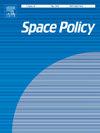A cosmopolitan approach to international law (CAIL) reflection on the space development experience of Africa
IF 2
4区 社会学
Q2 INTERNATIONAL RELATIONS
引用次数: 0
Abstract
Space power theory from the realist school states that the proliferation of space technology is a foe rather than a friend because it contributes to military and economic competition; and, above all, it empowers the exercise of threat of force in, through and from Outer Space. It is thus important to examine questions of justice in one's professional field and locate the analysis of one's practice within wider social, economic, and political context. While law is not justice and simply announces the form of justice sought, the approach taken in this paper is more precisely the lived experience or mental processes of consciousness and its aim begins a conversation to investigate this in a rigorous way. The cognitive act that characterizes the phenomenological reflection is “paying attention.” Therefore, this reflection contemplates the relevance of experience and reflective practice as a valuable methodology for using insights and learning from the past to support the assessment of the present and recommendations for the future. This is applied in the case of over 17 years of personal experience in following the development path of African space programs. The paper concludes that the African case confirms that multi-level governance is an approach that is of importance, and Africa is in a unique position to master this as stakeholders must think about how to engage in space development at all 4 levels: the global, regional, national, and local level.
国际主义的国际法方法(CAIL)对非洲空间发展经验的反思
现实主义学派的空间力量理论指出,空间技术的扩散是敌人而不是朋友,因为它有助于军事和经济竞争;最重要的是,它赋予了在外层空间、通过外层空间和从外层空间行使武力威胁的权力。因此,在一个人的专业领域审视正义问题,并在更广泛的社会、经济和政治背景下对一个人的实践进行分析,是很重要的。虽然法律不是正义,只是宣布寻求正义的形式,但本文采用的方法更准确地说是生活经验或意识的心理过程,其目的是开始一场对话,以一种严格的方式来调查这一点。表征现象学反思的认知行为是“注意”。因此,这一反思考虑了经验和反思实践的相关性,将其作为一种有价值的方法,利用过去的见解和学习来支持对当前的评估和对未来的建议。这适用于我在遵循非洲空间方案发展道路方面超过17年的个人经验。该论文的结论是,非洲的案例证实了多层次治理是一种重要的方法,非洲处于独特的地位,可以掌握这一方法,因为利益相关者必须考虑如何在全球、区域、国家和地方四个层面参与空间开发。
本文章由计算机程序翻译,如有差异,请以英文原文为准。
求助全文
约1分钟内获得全文
求助全文
来源期刊

Space Policy
Multiple-
CiteScore
3.40
自引率
36.40%
发文量
40
期刊介绍:
Space Policy is an international, interdisciplinary journal which draws on the fields of international relations, economics, history, aerospace studies, security studies, development studies, political science and ethics to provide discussion and analysis of space activities in their political, economic, industrial, legal, cultural and social contexts. Alongside full-length papers, which are subject to a double-blind peer review system, the journal publishes opinion pieces, case studies and short reports and, in so doing, it aims to provide a forum for the exchange of ideas and opinions and a means by which authors can alert policy makers and international organizations to their views. Space Policy is also a journal of record, reproducing, in whole or part, official documents such as treaties, space agency plans or government reports relevant to the space community. Views expressed in the journal are not necessarily those of the editors or members of the editorial board.
 求助内容:
求助内容: 应助结果提醒方式:
应助结果提醒方式:


